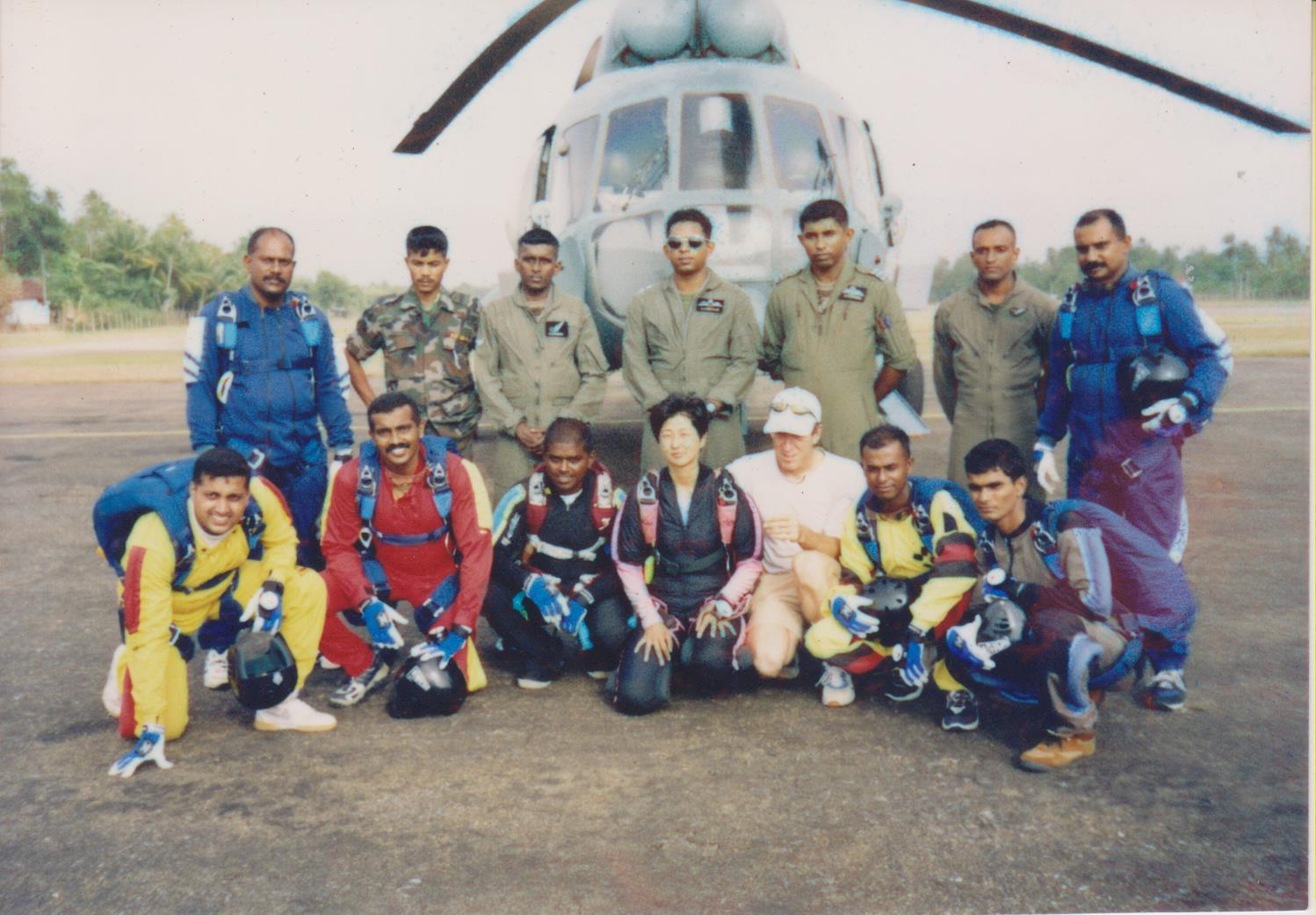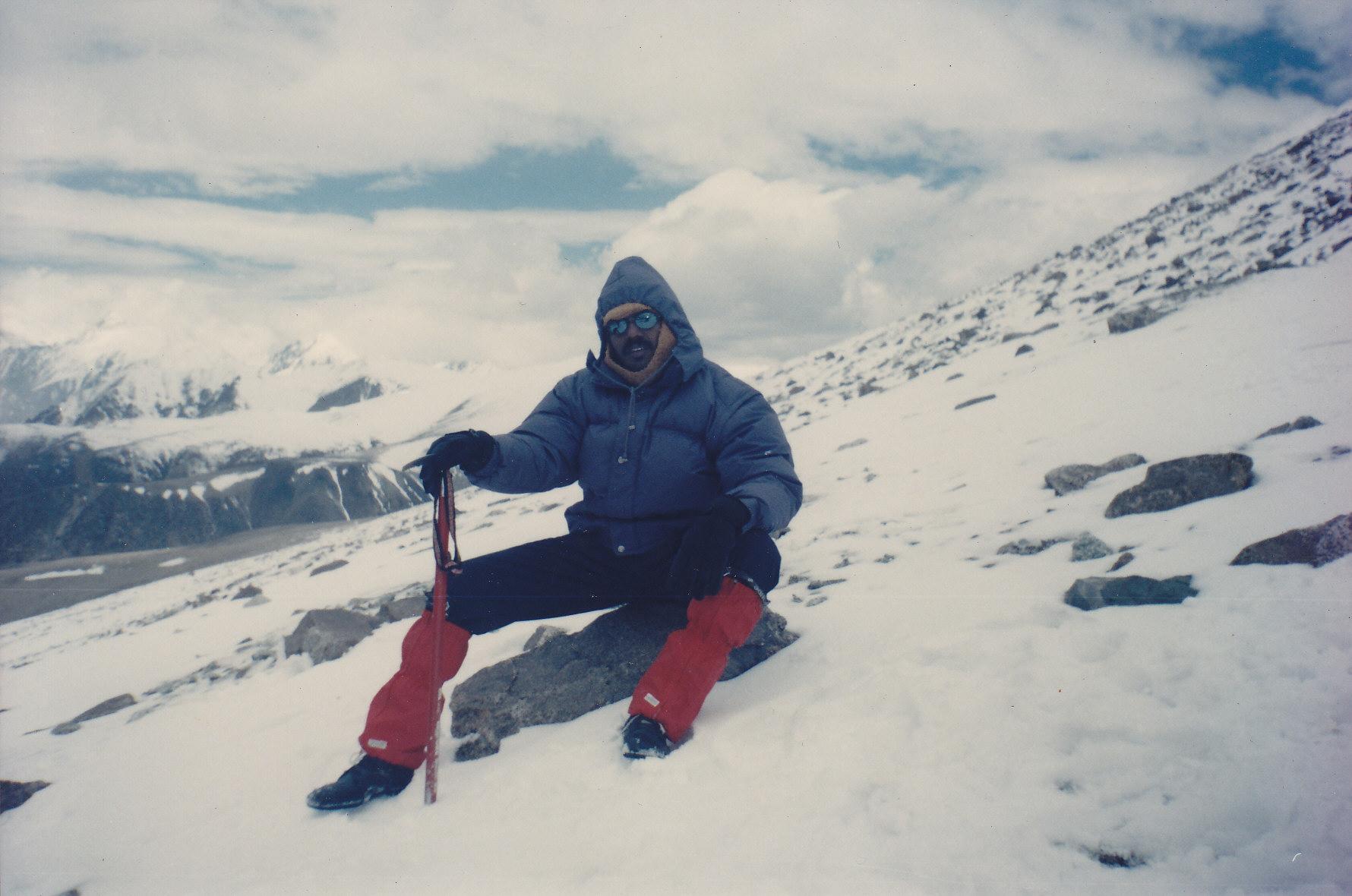02 Jul 2020 - {{hitsCtrl.values.hits}}
“I’m still alive, I am not dead, I’m not dead… I told myself” says Keerthi Kanaheraarchchi, a former Lieutenant attached to the Sri Lanka Air Force, soon after he plummeted to earth from 15,000 feet during a failed parachute jump. The fateful day was 6 August 2002, as Keerthi and his colleagues leapt into the sky to perform for the 14th Asian Athletics Championships in Colombo in bad weather. With the parachute not opening properly, the wind then blew him off course at high speed and Keerthi smashed into a wall whilst attempting to land; but he survived and is today walking proudly as narrating his tale.
Recollecting those initial moments on the ground, Keerthi recalls he felt as if two large fiery iron balls were revolving inside his head and everything seemed dark. He recounts feeling everything below his waist was broken, and a searing pain rising from the base of his spine into his head. Screaming for help, Keerthi was helped by residents and was taken to the Colombo National Hospital.
“Usually, there are ambulances, doctors and service staff present when we do a skydive. However, I fell far from the planned landing site, I think it was near the basketball court at the Kotahena Convent. Therefore, it was a very different experience”
The doctors had felt his legs would have to be amputated, but scans later revealed this was not so but he would be confined to a wheelchair for the rest of his life – a cripple. With an 8-year old daughter at the time, his wife and two ageing parents to tend to, life now ahead presented much more than a challenge for Keerthi, despite having cheated death.
“Nothing below my waist was working during the first six months, and all my muscles wasted away. My legs were useless. I had to endure nine surgeries to fix broken bones over a period of time, and physiotherapists would come give exercises. I entered the Army Hospital and was finally able to move my leg about an inch and then maybe two more. After about six months I was able to lift my legs with 100-gram sandbags. This was an extremely painful process, and I used to bite into my pillow and cry to try stifle the pain.”
A little after a year since the accident, Keerthi’s father passed away, and he tells that life and time evolved into a delirious blur of pain and sleep. Eventually, a friend passed a book onto Keerthi’s hands which detailed the life of World War II Russian pilot, Alexey Maresyev, a double amputee. Maresyev was shot down near Staraya in Russia, but despite being severely injured made it back to Soviet-controlled territory after three weeks, and subjected himself to a year of rigorous exercise to master control of his prosthetics to return as a decorated fighter pilot.
This story brought immense inspiration and strength to Keerthi, who started believing that he too could overcome his difficulties just like Maresyev did.
“Little by little I managed to bend my knees, and use the wheelchair with my legs down. Then I managed to move up to the parallel bars and walk with its support, mostly pushing the weight on to my arms. Eventually I made it onto crutches. This was over one-and-a-half years later. Then having graduated to one crutch, I was later able to walk only with the aid of a walking stick – I was 38 by that time. I wasn’t going to give up, and ultimately I started walking without a stick by just holding onto walls. Initially I was walking slow and feebly, but I was able to pick myself up – not give up – and now I walk just as well as anyone. That took me almost two years. Today, I can do almost anything a physically fit person could do. I walk, run, go to the gym, I do my self-defence classes and I even learnt angampora (traditional self-defence technique).”
Having retired from military service in 2004 and having successfully conquered the tragedy, turmoil and challenges presented to his life and mind following the accident, Keerthi and his family briefly moved to the US. But he wasn’t happy with life there, and decided to come back to Sri Lanka.
Keerthi then decided to try his hand and render his service to the corporate world, and today he leads the sales force of a leading brewer in the country, and is proud to have spearheaded the highest growth of sales and market share in his category. Despite having no prior experience in this segment, Keerthi is immensely prod of his achievements in sales and the corporate fold, and vows to go even further for greater things in time to come.
“What I wish to highlight is that you must never give up on life. There is nothing a person cannot do. I used to be scared of heights, but if I continued in that vein I would neve have become a skydiver. If I had just gone by what the doctors said and not made an effort, I would probably still be in a wheelchair. I have proved those wrong. All of us are equal as humans, and we are capable of anything. It is simple people that end up doing great things, it all depends on your determination. If you think it, there is nothing we cannot do despite the greatest challenges,” Keerthi beams with pride.
Just as he says, Keerthi is hive of energy and activity. Watching him walk, or run, and with an effervescent smile on his face, hardly anyone could guess the tragedy and difficulty he faced almost 20 years ago. Few who have fallen from the sky have lived to tell the tale, and it is even fewer who have found the courage and will to do what keerthi is doing today. He is without doubt a walking example of the potential of human will and determination to overcome adversity of any sort.
Keerthi hails from Yatagala in Galle, and his father was a renowned traditional physician in the area who treated people for free. His father ran a traditional medicine shop in Galle town. The only child in the family, Keerthi was a student at St. Aloysius College Galle, before moving to Ananda College Colombo following a scholarship.
“Grade 6 was housed at the top floor of a five-story building at Ananda those days. The balcony was closed off with iron pipes, but we used to climb onto it during playtime. I remember climbing onto the balcony one day and looking down, and I was mortally scared. I didn’t want my friends to know so I slowly climbed down and I never played or looked down from there again. I used to play at the bottom after that,” he laughs.
Keerthi was an avid sportsman and became the athletics champion at Ananda and also took part in nationals and held a number of records. He still holds the Under-17 800 meters at Ananda. Many Anandians join the armed forces, and the students used to like watching senior cadets and old boys coming into school in uniform, and this was great motivation for them, he says. After completing his Advanced Levels in 1984, Keerthi joined the Air Force as a Cadet Officer, despite protests from his parents.
Training at the Diyathalawa camp for two years Keerthi topped his batch, and was given his first appointment to train new cadets at the camp. He recalls the 40-foot water tank at the camp premise, and how he and his friends decided to climb the tank to take in the wonderful scenery around Diyathalawa, including the Haputhale mountain range and the sprawling tea estates.
“After absorbing the view, when we were about to go down, the same fear I felt looking down from my Grade 6 balcony engulfed me. I was petrified, and was feeling faint. My friends made great fun of me that an Air Force Cade Officer is afraid of heights, but I eventually made it down.”
“We didn’t have internet back in the day. But I did some research to see how I could overcome my fear, or rather my phobia. I was determined to overcome it.” Keerthi, as part of his training, started scaling high points including buildings and mountains. “I started climbing down the rope during training specifically to overcome my fear of heights, which then went all the way up to climbing down a rope from a helicopter.” During this period, he also had the opportunity to go for special training in the mountains of Pakistan, conquering the Karakoram range and the foothills of the Himalayas unaided.
Keerthi then became a member of the first skydiving unit of the Sri Lanka air force, after qualifying to receive training with the Sri Lanka Army Commandos, and then subsequently at the training school in Singapore. “There are only one or two vacancies to learn and jump with the commandos, and its based on some purely physical tests. I qualified. During that time, we had skydivers coming from Singapore to perform at our Independence Day celebrations, creating various formations and patterns in the sky all whilst falling at almost 200 feet per second. I was captivated by this and wanted to try our hand at it too.”
This was the story of how Keerthi overcame his biggest fear to became one of Sri Lanka’s first and leading skydivers, before fate dealt him a dirty hand to what had become his passion. But drawing on that same passion and determination to overcome all odds, Keerthi conquered life’s greatest challenge and is today a far cry from the little boy afraid of heights, or a potential cripple confined toa wheelchair. He, like he alluded to, is a living example of human determination and will, and our capacity to do and overcome.



26 Dec 2024 4 hours ago
26 Dec 2024 5 hours ago
26 Dec 2024 6 hours ago
26 Dec 2024 7 hours ago
26 Dec 2024 8 hours ago